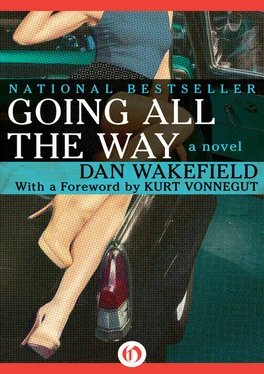Just then a big guy in a wild sport shirt that said “Waikiki” all over it entered the car, cased the scene, and plopped down right in the empty seat beside the girl. The guy had tattoos on his forearms, which probably meant he was dumb. The soldier consoled himself with the thought that the poor guy didn’t have a chance.
“Talk about your early summer heat,” the tattooed man said loudly to the girl, “I bet it’s hot enough to fry an egg on the sidewalk.”
How corny could you get? The soldier really felt embarrassed for the poor guy, and he hoped the girl didn’t brush him off too bad. But the girl was smiling.
“In St. Louis, I bet you could,” she said.
They laughed—together. The guy ordered drinks for him and the girl, and soon they were chattering away like old pals. The soldier tried not to hear them. He tried to think of important things, like the Future, not some silly broad on a train you could pick up just by giving her a stale old line about the weather.
What burned him up most was the guy wasn’t even a serviceman. It didn’t seem fair. The young man had hoped that when he went in the Army he’d be able to pick up all the girls he wanted, just by being in uniform. As a kid he had seen all those World War II movies where an ordinary GI could go to the Stage Door Canteen and dance the night away with Judy Garland, or maybe just walk down the street and have June Allyson pop out from behind some shrubbery and say, “Hi, soldier,” and walk off with him into the sunset. Of course, you could guess what happened in the sunset, even with nice girls like June Allyson. It didn’t mean they were bad, it meant they were patriotic. But Korea wasn’t the kind of a war that got you laid for being in it. The young man had worn his uniform for two years, and it hadn’t done shit for him. The only broad who said, “Hi, soldier,” to him was a dumpy old babe around forty at the USO in Kansas City. She gave him some oatmeal cookies that crumbled in his hand.
The war wasn’t really a war—a “police action” some of the papers called it—and nobody gave much of a damn about it except for the politicians and the military men and of course the guys who got drafted and all their relatives. Being a soldier during that half-assed war was like being on a team in a sport that drew no crowds, except for the players’ own parents and friends. The young man had got a much bigger kick out of World War II, when he served on “The Homefront” as a kid collecting scrap metal and tinfoil and raising a “Victory Garden” of radishes and carrots that nobody ate, and learning to be an “air-raid spotter” so that if the Nazis decided to bomb Indianapolis—thereby knocking out the very heart of the nation—he would be able to stand on the roof of the Broad Ripple lumberyard and spot the Stukas and the Messerschmidts as they dove toward such cultural targets as the Soldiers and Sailors Monument or the world-famous Indianapolis Speedway. World War II had been a fun war, full of glamour and glory, but Korea was just a bore, a national nuisance, drab as olive. His whole generation had been stuck with it, but somehow the young man took it as a personal piece of bad luck. Just the sort of thing that was always happening to him.
“You like the races, huh?” the tattooed guy was asking the blonde. The soldier didn’t want to hear about it. He got out the rolled-up copy of the latest Newsweek magazine he had stuck in his hip pocket, and plunged into it right at the hardest part, foreign affairs. As well as doing daily exercises in the fruitful, new life that the young man was going to begin, he had also promised himself he would keep his mind in trim, stay up on things, be alert and informed, and as part of this resolution he planned to read Newsweek magazine each and every week, not just the sports and entertainment sections but the world and national news and the art and literary parts. Most everyone read Time , and the young man figured he might have a little edge by being a Newsweek reader, might just be a little more in the know than your average citizen.
The big world news was about the “crisis” of the Fall of Dienbienphu, the French bastion in part of the Commie Orient. It sounded pretty bad. The magazine said that
While it might turn out to be only a heroic incident in the continuing struggle to contain aggressive communism, it might prove to be the cataclysmic event that would trigger a chain reaction culminating eventually in a third world war—this time an atomic war of unimaginable deadliness and devastation.
Fuck it all. More of his kind of luck—the next world war not only wouldn’t be any fun, it would probably kill everybody. He often had this feeling that maybe if he ever got settled down, married to a great, sexy-looking babe who was also very tender and motherly—sort of a cross between Marilyn Monroe, Grace Kelly, and old Jane Gallagher of The Catcher in the Rye —and he had a great job that paid a lot of money and a couple of beautiful kids and had just moved into a cozy house with a lot of fireplaces and a white picket fence, he would go out to pick up the mail and look up in the sky and see a monstrous mushroom-shaped cloud, and that would be the end. He regarded the H-bomb too as a personal menace, a weapon uniquely and insidiously devised to scare the shit out of him, until it finally blew him to smithereens.
He couldn’t finish the article about the latest world crisis, and he flipped through the magazine in search of some less depressing stuff. “Business Trends” said that the Atomic Energy Commission was encouraging colleges to expand their courses in “nuclear studies.” Senator Joe McCarthy was fighting with the Army, making more of his famous “points of order,” trying to scare everyone about the Reds in government. The first jet transport plane was almost finished. Roger Bannister had broken the four-minute mile. That was something, but the soldier already knew about that. He turned to the book section, hoping to improve his mind. There was a story about some philosopher who a lot of eggheads thought was hot stuff. It said:
Sören Kierkegaard, a melancholy Dane of a century ago, is a triple-threat hero among modern intellectuals. He unwittingly fathered the gloomy philosophy of Existentialism. He anticipated the rise of modern remorse by developing a twentieth-century sense of guilt in the heyday of the optimistic nineteenth.…
Shit. The soldier figured he was even born in the wrong damn century. The century of gloom and guilt. Wouldn’t you know it? He finished his beer and looked up to see if he could flag down the grumpy, indifferent waiter. A foom of the air-compression door announced the entrance of somebody new in the club car, and the young man turned to look.
At the entrance to the car was the soldier whose face had floated up to haunt him from the steam of the hissing train on the platform. He was tall, built in an angular way with broad shoulders that sloped in a V to a narrow waist and hips, and long, slightly bowed legs. His face was lean and dark from the kind of a beard that never quite shaves completely away, leaving a permanent five-o’clock shadow. The face was naggingly familiar to the chubby young soldier who was staring at him, and yet he couldn’t quite place it. The tall soldier started walking forward, when the train gave a sudden lurch that sent beer cans skittering precariously over the chrome tables in a general clatter, and something fell and smashed behind the bar. It was the sort of jolt that usually sent anyone who was walking down the aisle reeling into the lap of some stranger, but the tall soldier seemed to catch the very motion of the car with his hips, feinted with it, and continued on, his expression unchanging, his rolling gait with the feet pointing inward moving ahead, ready for anything. It was with the movement that the graceful soldier revealed his identity, for it was the same elusive, flowing sort of move that had so often evaded enemy tacklers, the natural action of the greatest broken-field runner in the history of Shortley High.
Читать дальше












